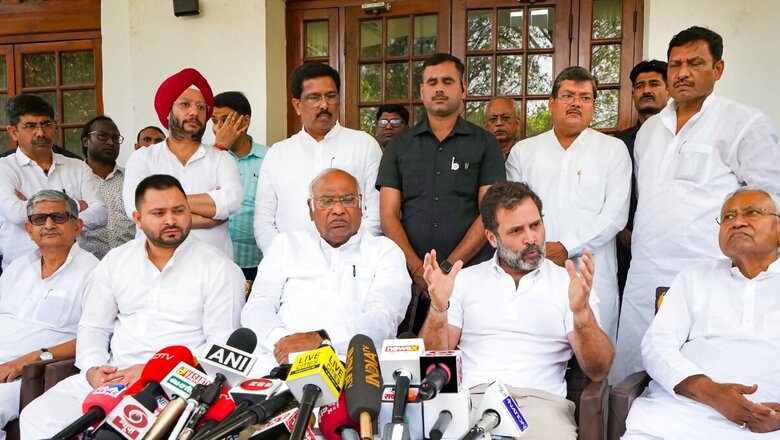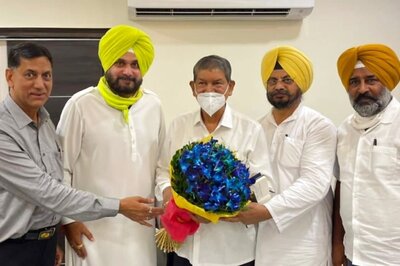
views
An article on 2020 US presidential elections, ‘Death by a thousand cuts: How Trump was robbed’ (Spectator Australia), details how Donald Trump was made to lose not by “in the face” criminality-like outright hacking of voting machines, but what can be better described as “death by thousand cuts”. None of these acts on its own amounted to prima facie wrongdoing, but in reality each is a scam that maintained a veneer of respectability.
The article talks about how they changed election laws just before the polls in such a way where previously illegal practices were made legal (mail in ballots and standards of verification), role of Big Tech that hid anything about Joe Biden and his family corruption, particularly his son Hunter Biden laptop explosive revelations, $400 million donation by Mark Zuckerberg that created organisations that state governments hired to run the election in swing states across the nation, among others.
The Zuckerberg-funded activist organisations which were supposed to be non-partisan focused their resources on multiple ways to benefit Biden and impede Trump in carefully selected counties with slim electoral vote margins. To top it all, Big Tech banned any criticism of the election. The article summarises the US 2020 election as, “in combination, an election where western deep state used extraordinarily and deceitful measures as a new form of institutional gerrymandering particularly in few swing states to change the outcome of the election”.
While the situation in Bharat is not exactly the same as in the United States, the end goal of subversion of the election process to institute regime change in 2024 has actually started happening in full swing by the breaking India forces using various methods. The detailed micro and macro planning by well-funded experts cannot be missed by anyone with a discerning eye. Word is that there are about 220 to 240 Lok Sabha seats identified across the country where there is tacit agreement among Opposition parties to field only one strong candidate with a sprinkling of weak candidates from the rest of the Opposition parties. These locations must have been carefully selected with thin margins to engineer an outcome. Just as the article on US elections said, there is nothing wrong on the surface but the voter as well as competition (BJP) is deceived that it is a multi-party candidate election whereas in truth it is not.
Just as in the US where supposedly non-partisan organisations created using a very large donation by Zuckerberg manipulated elections in carefully selected areas, India has its own set of NGOs, literally thousands funded by foreign entities. Adding to this, as documented in works like Snakes in the Ganga, there are many entities ostensibly created as companies providing services in the remote areas to circumvent Foreign Contribution Regulation Act laws. On the surface they are providing services but their reach is being used to propagate subtle messages to affect election outcomes. Their extensive reach to the last-mile voter can have deadly consequences for holding a free and fair election.
In recently-held elections in Karnataka, third party campaigning is believed to have been done by several NGOs in the remote areas more than a year before the election, saying that the ruling BJP is a “40 percent cut” party. The problem is these subtle campaigns are done in the name of NGOs established for public good or in the name of providing service. Worse, in the case of Karnataka it did not give a full picture of corruption in the state where the then Opposition party itself was led by someone accused of amassing thousands of crores of rupees in corruption.
Free and fair elections in India are challenged by another phenomenon called ‘freebies’. The recent Karnataka elections is again a case in point (along with other states like Punjab, Delhi) where freebies promised are believed to have played a large role in election outcome. This will be one of the strategies that could be used in 2024 as well with carefully planned messages propagated through media, NGOs, dubious service organisations and third-party campaigning.
This freebie culture raises many questions that the country needs to urgently address if democracy is to be preserved. First, these are not funded by politicians or political parties promising them, it is taxpayer funds. Do the parties have agreement from taxpayers to give away their funds? Then, there is even the issue of whether the promises made during elections to get votes can even be met, as is seen in Karnataka where big promises are made before elections and after winning elections, so many ifs and buts have been put in place to receive these freebies, which according to some outlets make almost everyone ineligible. None of the parameters for receiving the freebies was ever announced nor a true picture was given to voters before the elections. If voters were enticed and duped with such false promises, how can that be considered a free and fair election?
On the other hand, if the promises for freebies are kept after winning elections causing a large drain on the state budget, were the voters informed of the consequences of the drain, the lack of funds to do development projects and other state-provided services?
Then there is the question of making secret promises to sections of the voting community. Going back to Karnataka, after the election results were announced Muslim leaders stated that they were promised a Deputy CM and five ministerial positions that must have certainly helped to gain a large number of votes of that community which constitute about 13 percent of the total voter community in the state according to the 2011 census. When such wild promises are made, should this not be informed to the rest of the voting community before the elections so that an informed decision can be made by them? Yes, the bluff can be called when the next election comes after five years, but the voters get stuck for five years. One suspects this ploy will be used in 2024 as well, with deadly consequences.
Last but not the least, there may be attempts at creating multiple artificially created regional and national disturbances to divide and incite communities using well-devised toolkits.
One really hopes Bharat is prepared for these highly sophisticated and well-funded toolkits seeking to destabilise the country and usher in a regime change. The 2024 election will be a momentous one, in that case.
The writer is a US-based activist who has played a critical role in the introduction of paper trail for India’s Electronic Voting Machines called VVPAT. Views expressed are personal.




















Comments
0 comment